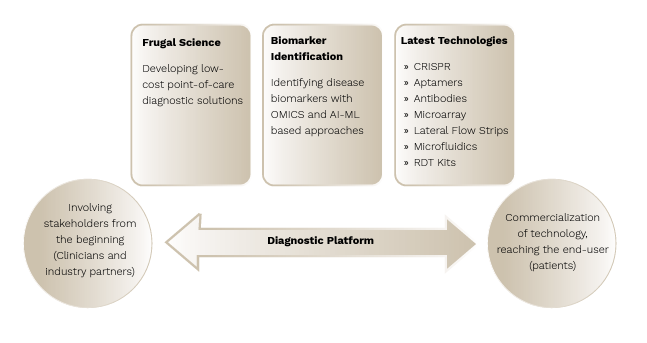Molecular diagnostics provides powerful tools for early and more accurate diagnosis of diseases, paving the path towards personalized medicine. Accurate diagnosis is the key to the right treatment, and early diagnosis of a disease is critical for saving lives. Absence of cost-effective diagnostic methods and delayed or inaccurate diagnosis remain a health care challenge in our country. To address the existing diagnostics gap, we are developing a platform for diagnostic solutions for various infectious and rare diseases using the latest cutting-edge technologies like CRISPR.
Our diagnostics platform is focused on developing novel, low-cost, point-of-care diagnostic solutions suitable for field application in India using the latest cutting-edge technologies such as CRISPR, digital PCR, isothermal amplifications (LAMP and RPA) as well as NGS panels. The aim is to provide innovative solutions for early diagnostics that are rapid, robust, affordable, and accessible to the remotest part of the country.

- Developing Indigenous CRISPR/CAS Based Diagnostic Platform for Infectious and Rare Diseases for Field Application in India
- Molecular Diagnostics of Plant Pathogens
- Detection and Differentiation of HPV Genotypes 16, 18 and 12 other High-Risk (HR) Types for Early Screening and Patient Management
- Detection of Respiratory Pathogens (Influenza A, Influenza B, RSV A and B, SARS-CoV-2, Influenza A H1N1, Influenza A H3N2 from Clinical and Wastewater Samples
India accounts for 3% of global malaria cases and 27% of global tuberculosis cases, with a quarter of the latter being drug resistant. There are several disadvantages to the current rapid diagnostic test-based detection of malaria, and drug-resistant tuberculosis detection takes several weeks. At TIGS, we are developing CRISPR-based diagnostic solutions for malaria and tuberculosis. We have standardized the amplification of target regions for CRISPR-based detection of the malarial pathogen Plasmodium falciparum as well as Mycobacterium tuberculosis with high sensitivity and are currently in the process of performing clinical validations.
We have started work on developing CRISPR-based assay for detection of Dengue.
The platform has a keen focus on both indigenization and bolstering the stability of reagents. Our efforts have led to streamlining the production of various Cas enzymes such as Cas9, Cas12, Cas13, and Cas 14 at a lab scale. By optimizing indigenization strategies, we’ve successfully slashed reagent costs by half, and we aim to further reduce costs by indigenizing polymerases.
In rare genetic diseases, the expense and requirement for specialized infrastructure and expertise in sequencing or multiplex ligation-dependent probe amplification (MLPA) post-symptom onset pose challenges. To tackle this issue, low-cost, targeted nucleic acid-based panels stand out as an approach. Our ongoing strategy involves optimizing CRISPR-based methods for detecting SMA (Spinal Muscular Atrophy) and DMD (Duchenne Muscular Dystrophy).
Investigator: Harvinder Kour Khera
Collaborators:
Bangalore Baptist Hospital, Bengaluru
Manipal Hospital, Manipal
Jawaharlal Institute of Post Graduate Medical Education and Research (JIPMER), Puducherry
We aim to develop kits for plant pathogen detection: Sarocladium oryzae detection in rice
Investigator: Harvinder Kour Khera
Collaborator:
University of Agricultural Sciences, GKVK, Bengaluru
To detect and differentiate Human Papiloma Virus genotypes 16, 18 and twelve other high-risk (HR) types (16,18,45,31,33,35,39, 51,52,56,58,59,66,68,73) for early screening and patient management using cervical/vaginal swab samples. Integrate the assay with a “self-collection method” to increase the population coverage for screening.
Investigator: Satyaprakash Pandey
To develop a qRT assay that can detect and distinguish the respiratory pathogens- Influenza A, Influenza B, respiratory syncytial virus (RSV) A and B, severe acute respiratory syndrome coronavirus 2 (SARS-CoV-2) and subtyping influenza A H1N1 and H3N2 strains using molecular diagnostics in clinical and environmental wastewater samples.
Investigator: Satyaprakash Pandey
